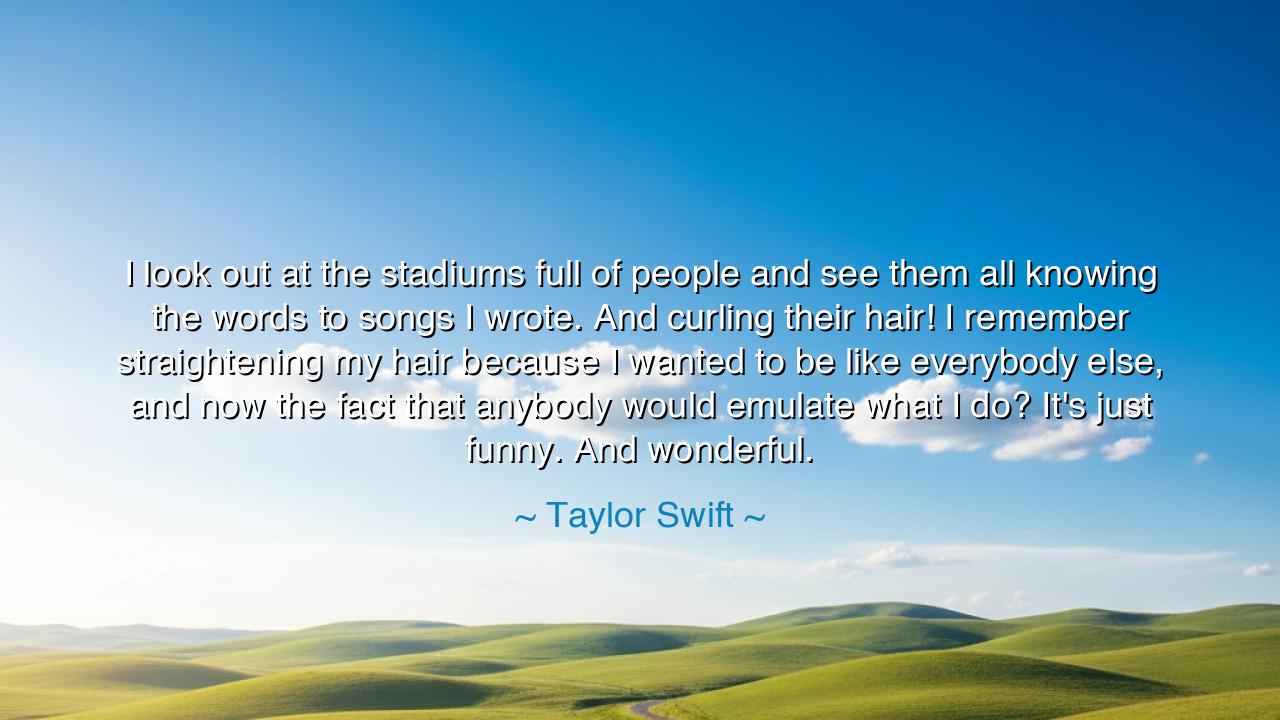
I look out at the stadiums full of people and see them all
I look out at the stadiums full of people and see them all knowing the words to songs I wrote. And curling their hair! I remember straightening my hair because I wanted to be like everybody else, and now the fact that anybody would emulate what I do? It's just funny. And wonderful.






When Taylor Swift said, “I look out at the stadiums full of people and see them all knowing the words to songs I wrote. And curling their hair! I remember straightening my hair because I wanted to be like everybody else, and now the fact that anybody would emulate what I do? It’s just funny. And wonderful,” she spoke not only as a musician, but as one who has witnessed the long arc of transformation — from self-doubt to self-acceptance, from imitation to influence. Her words are filled with humility and awe, and they carry the timeless wisdom that authenticity, when embraced fully, becomes its own kind of power. She reminds us that the journey to becoming oneself often begins in the shadow of others, but ends in the light of self-realization.
The origin of this reflection lies in Swift’s own story — a young girl from Pennsylvania who once longed to fit in, who straightened her naturally curly hair to match the image of beauty she thought the world required. Like so many before her, she believed that acceptance came through sameness. Yet through her art, through the vulnerability of her songs, she began to see that what made her different was what made her luminous. Now, as she stands before stadiums filled with thousands, she sees the mirror reversed: those who once might have doubted themselves now emulate her. The cycle has turned — the follower has become the guide, and what was once insecurity has become inspiration.
The ancients would have seen in her words the pattern of every hero’s awakening. The philosopher Socrates taught that the path to wisdom begins with knowing oneself — not through imitation, but through revelation. The poet Ovid, in Metamorphoses, told of mortals who discovered their power only after abandoning disguise. Swift’s laughter — that it is “funny and wonderful” — is the laughter of one who has glimpsed the irony of destiny: that the very traits we once hid in shame often become the ones the world celebrates. To look upon others imitating her hair, her words, her presence, is to see reflected the triumph of individuality — a victory not of vanity, but of liberation.
There is tenderness in her recollection of wanting to be like everybody else, for it speaks to a universal ache — the yearning to belong. Every soul, at some point, bends itself toward the shape of others, fearing rejection. Yet as Swift’s journey shows, there comes a moment when imitation can no longer contain the spirit. The artist — the human being — must rise beyond conformity and claim the fullness of their voice. It is in this claiming that influence is born. For influence, unlike imitation, does not flow from striving to be like others, but from daring to be oneself so completely that others are drawn to follow.
Consider the story of Joan of Arc, a peasant girl who rose to lead armies not because she imitated the men around her, but because she spoke from her own conviction. She, too, was once dismissed, doubted, even condemned — yet her courage reshaped the world. Swift’s ascent, though peaceful and poetic rather than martial, follows a similar spiritual path: the triumph of authenticity over doubt. What was once deemed a flaw becomes a flame, what was once an insecurity becomes a symbol of strength. To see thousands curling their hair as she once straightened hers is not vanity — it is the poetic fulfillment of transformation.
There is also in her words a profound lesson on gratitude and humility. She does not boast of her fame; she marvels at it. The tone of her statement is not pride, but wonder — the wonder of one who still remembers what it was like to be unseen. In this remembrance lies her grace. For when the successful forget their humble beginnings, they lose their humanity; but when they remember, they keep their light. Swift’s laughter — her sense that it is both “funny and wonderful” — is the sound of that balance: the harmony between awe and awareness, between achievement and humility.
So, dear listener, let this be your lesson: do not despise your differences, nor your longing to belong. These are both sacred teachers. Let the years of uncertainty temper you, and let your insecurities remind you of your humanity, for they are the soil from which self-knowledge blooms. When you stand before your own “stadium” — whether that means one person or a thousand — let your joy be rooted not in imitation, but in truth. For when you embrace yourself fully, you become not only whole, but a mirror for others to find their own reflection.
Thus, Taylor Swift’s words endure as a parable for the modern soul. They teach that influence begins not with power, but with authenticity; that beauty lies not in sameness, but in courage; and that the journey from self-doubt to self-acceptance is one of the most sacred pilgrimages of all. To laugh, as she does, at the strange poetry of fate — to look upon one’s insecurities transformed into inspiration — is to understand the deepest wisdom of all: that the very parts of us we once tried to hide are the ones the world was waiting to see.






AAdministratorAdministrator
Welcome, honored guests. Please leave a comment, we will respond soon